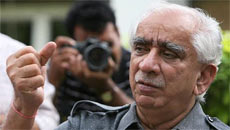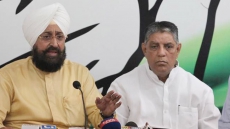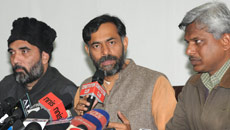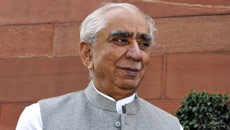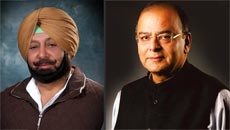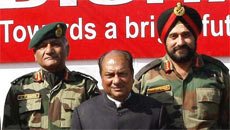Up to 16 people were killed on Monday as a devastating flood in the Kashmir Valley forced thousands to flee to safer places as rain-fed streams rushed down the mountains, flooding parts of Srinagar. A man was washed away by a swollen river in Jammu region.
As the water level in the Jhelum river rose menacingly, a high alert was sounded in the region. Fearing a repeat of the terrible September 2014 floods that killed over 200 people, entire families deserted their homes in low-lying areas.
For Nisar Hussain, 65, who lives in Gogjibagh area of Srinagar with his 60-year-old wife and 27-year-old daughter, this was the second uprooting in six months.
A landslide in Laden village in Budgam district buried two houses, trapping 16 people from two families under the debris. While six bodies were found by evening, all others are feared killed, officials said.
The dead included four women, a man and a 22-day-old baby.
A vehicle carrying cattle on way to Udhampur from Doda was caught in flash floods in Jammu. A young man, Angrez Singh, was washed away.
In Srinagar, a worried Chief Minister Mufti Muhammad Sayeed visited the water-logged city centre Lal Chowk and interacted with traders and common people.
He assured the traders that the government would take up on priority basis providing relief to businessmen who suffered in 2014.
Sayeed announced Rs.25 crore from the Chief Minister's Relief Fund for the worst hit Kashmir Valley and Rs.10 crore for Jammu region.

Flood-hit resident Nisar said he had to quickly shift his family after a flood alert was sounded by the authorities on Sunday night.
"This is traumatic. My daughter refused to live at Gogjibagh after news about the rising Jhelum river was flashed on TV," he said.
Ghulam Rasool, a 56-year-old in flood-hit Rajbagh, did not even wait for the authorities to issue the flood warning.
"I left everything behind and shifted out of my home with my family hardly four hours after it looked like the rain was unending on Saturday night," he said.
Flood waters inundated the Jammu-Srinagar highway at Pampore town, 12 km from Srinagar, snapping road links between the state's winter and summer capitals.
The Jhelum was flowing at 22.8 feet at Sangam in Anantnag, at 19 feet at Ram Munshi Bagh in Srinagar and at 11.55 feet at Ashim in Bandipora, an official told IANS.
People living along the banks of Jhelum were told to move to safer places.
And residents in flood-prone areas of Srinagar, especially those in Rajbagh, Jawahar Nagar, Wazir Bagh and some more places, hurriedly shifted to safer places. The process began on Sunday evening.
Many shopkeepers along the Residency Road and Lal Chowk commercial hub moved their merchandise to safer places. These were the worst hit in 2014.
Authorities said more than 80 public and private properties were damaged in the incessant rains.
An avalanche warning was sounded in the higher reaches of the state. All examinations have been postponed till April 3.
Inter-district connectivity has been severely affected in the Kashmir Valley.
The weather office has forecast better days.

"There will be a decrease in precipitation from today (Monday). Another western disturbance is likely to hit the state on April 2 but the intensity is going to be much less," Sonam Lotus, director of the local Met Office, told IANS.
The central government was in constant touch with Jammu and Kashmir and monitoring the flood situation, officials said. Home Minister Rajnath Singh spoke to Chief Minister Sayeed.
Union Minister of State for Parliamentary Affairs Mukhtar Abbas Naqvi visited the Kashmir Valley and promised government assistance to people to tide over the crisis.
Two teams of the National Disaster Response Force (NDRF) have been deputed and four other teams are on stand-by.

